Lesson Plan for Beginner-Intermediate ESL/EFL Group Course
VerifiedAdded on 2022/10/13
|7
|1379
|114
Homework Assignment
AI Summary
This assignment presents a comprehensive lesson plan designed for a beginner-intermediate ESL/EFL group, targeting students aged 7-9 from diverse linguistic backgrounds. The lesson plan, which is 50-60 minutes long, focuses on enhancing writing skills, rectifying common grammatical errors, and fostering effective communication. The plan incorporates various teaching methods, including Total Physical Response and Cultural and Personal Relevance approaches, to engage students actively. It outlines specific objectives, such as improving writing skills and rectifying grammatical mistakes, along with a rationale for these objectives. The lesson incorporates diverse materials like handouts, blackboards, audio tapes, and video tapes to facilitate learning. The procedure includes housekeeping tasks, announcements, attendance tracking, and homework assignments. The lesson structure encompasses introduction, presentation of new content through various activities like word games and physical responses, practice exercises, and evaluation methods like examinations and essay writing competitions. References to relevant research papers are also included.
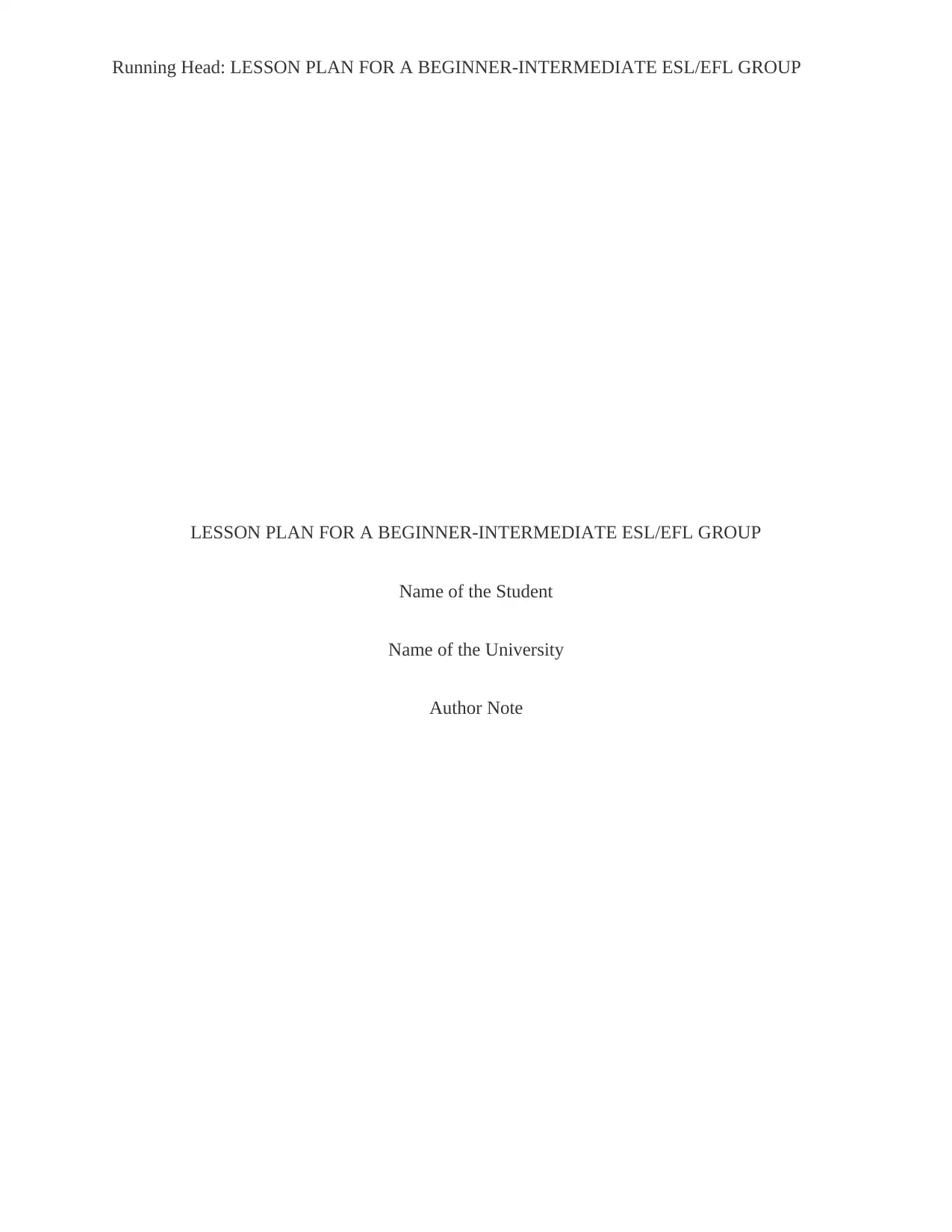
Running Head: LESSON PLAN FOR A BEGINNER-INTERMEDIATE ESL/EFL GROUP
LESSON PLAN FOR A BEGINNER-INTERMEDIATE ESL/EFL GROUP
Name of the Student
Name of the University
Author Note
LESSON PLAN FOR A BEGINNER-INTERMEDIATE ESL/EFL GROUP
Name of the Student
Name of the University
Author Note
Paraphrase This Document
Need a fresh take? Get an instant paraphrase of this document with our AI Paraphraser
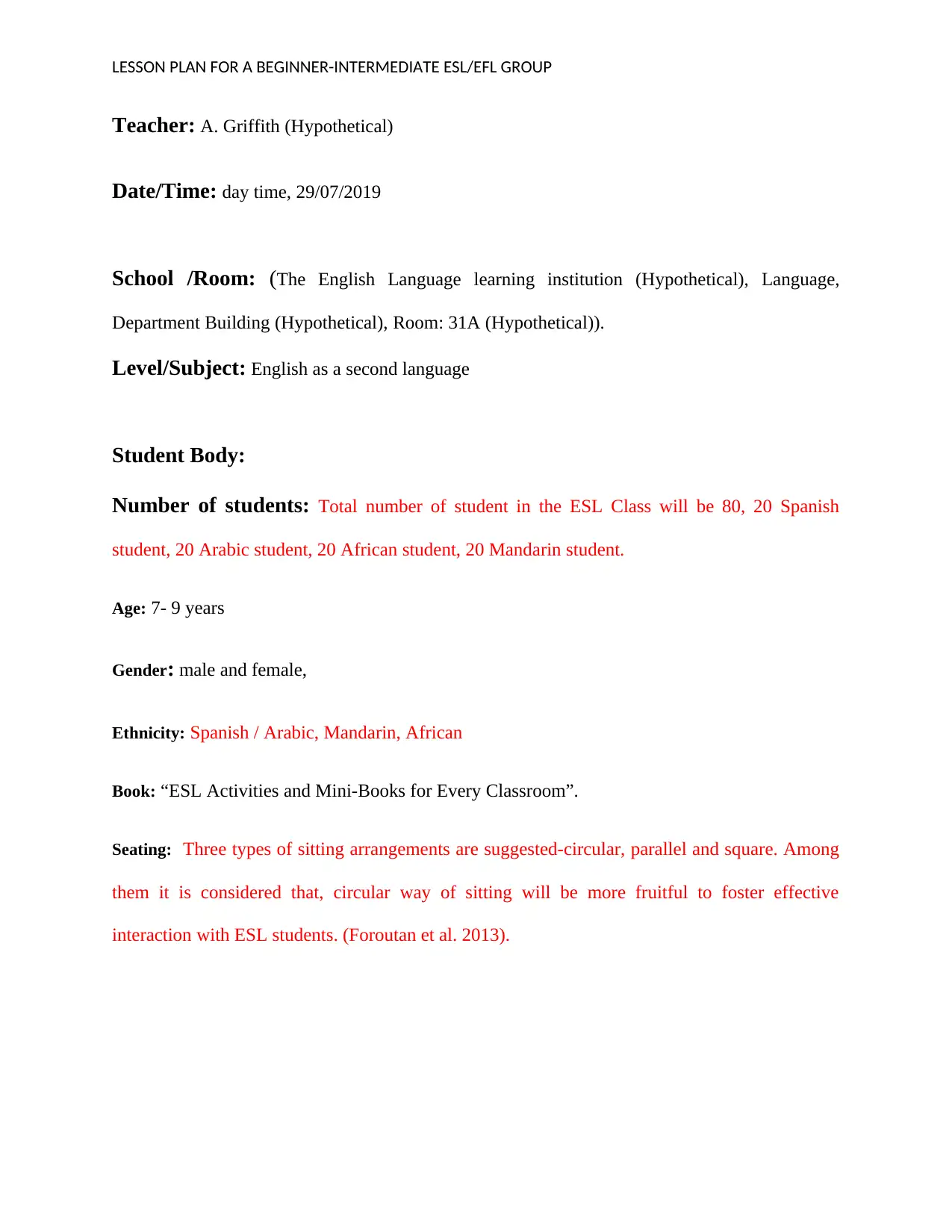
LESSON PLAN FOR A BEGINNER-INTERMEDIATE ESL/EFL GROUP
Teacher: A. Griffith (Hypothetical)
Date/Time: day time, 29/07/2019
School /Room: (The English Language learning institution (Hypothetical), Language,
Department Building (Hypothetical), Room: 31A (Hypothetical)).
Level/Subject: English as a second language
Student Body:
Number of students: Total number of student in the ESL Class will be 80, 20 Spanish
student, 20 Arabic student, 20 African student, 20 Mandarin student.
Age: 7- 9 years
Gender: male and female,
Ethnicity: Spanish / Arabic, Mandarin, African
Book: “ESL Activities and Mini-Books for Every Classroom”.
Seating: Three types of sitting arrangements are suggested-circular, parallel and square. Among
them it is considered that, circular way of sitting will be more fruitful to foster effective
interaction with ESL students. (Foroutan et al. 2013).
Teacher: A. Griffith (Hypothetical)
Date/Time: day time, 29/07/2019
School /Room: (The English Language learning institution (Hypothetical), Language,
Department Building (Hypothetical), Room: 31A (Hypothetical)).
Level/Subject: English as a second language
Student Body:
Number of students: Total number of student in the ESL Class will be 80, 20 Spanish
student, 20 Arabic student, 20 African student, 20 Mandarin student.
Age: 7- 9 years
Gender: male and female,
Ethnicity: Spanish / Arabic, Mandarin, African
Book: “ESL Activities and Mini-Books for Every Classroom”.
Seating: Three types of sitting arrangements are suggested-circular, parallel and square. Among
them it is considered that, circular way of sitting will be more fruitful to foster effective
interaction with ESL students. (Foroutan et al. 2013).
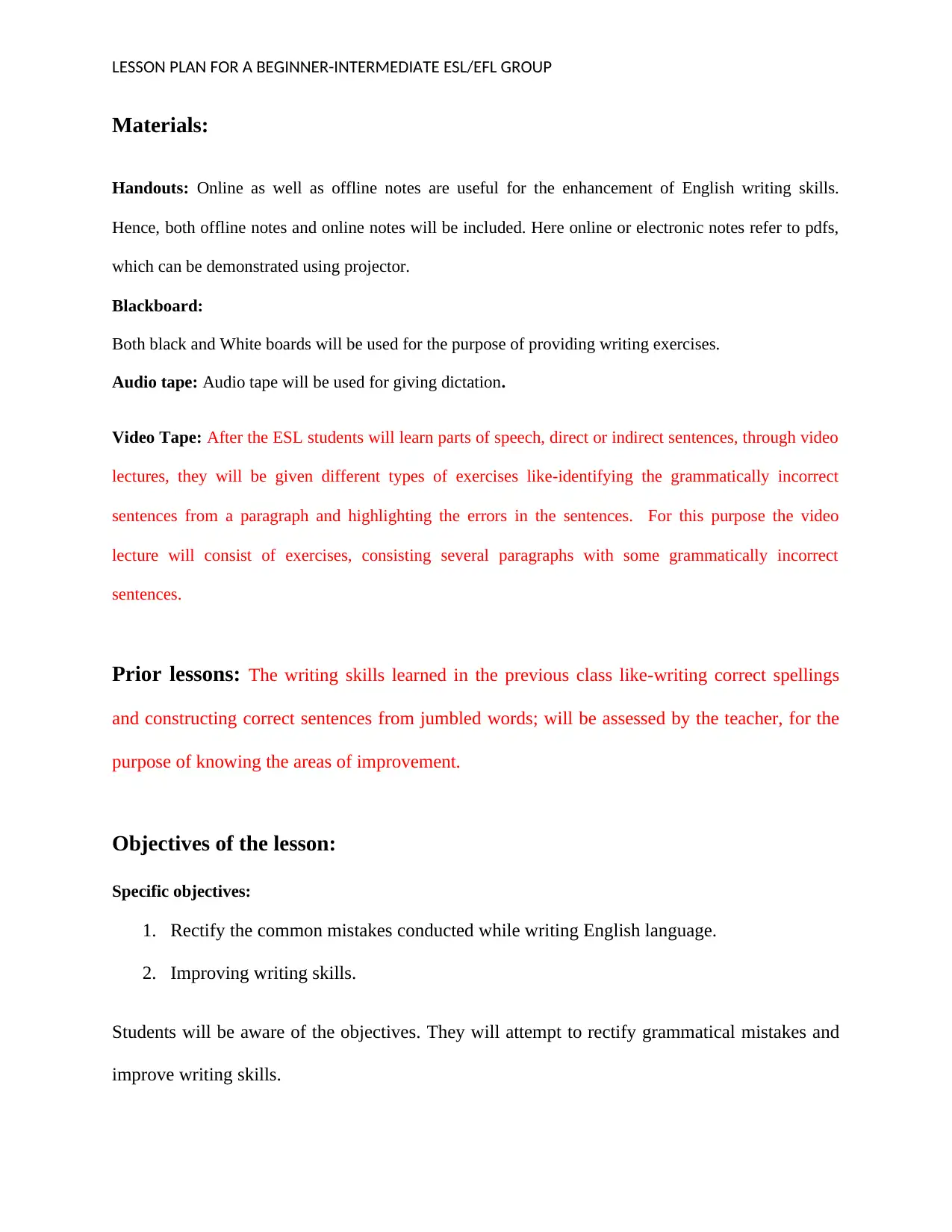
LESSON PLAN FOR A BEGINNER-INTERMEDIATE ESL/EFL GROUP
Materials:
Handouts: Online as well as offline notes are useful for the enhancement of English writing skills.
Hence, both offline notes and online notes will be included. Here online or electronic notes refer to pdfs,
which can be demonstrated using projector.
Blackboard:
Both black and White boards will be used for the purpose of providing writing exercises.
Audio tape: Audio tape will be used for giving dictation.
Video Tape: After the ESL students will learn parts of speech, direct or indirect sentences, through video
lectures, they will be given different types of exercises like-identifying the grammatically incorrect
sentences from a paragraph and highlighting the errors in the sentences. For this purpose the video
lecture will consist of exercises, consisting several paragraphs with some grammatically incorrect
sentences.
Prior lessons: The writing skills learned in the previous class like-writing correct spellings
and constructing correct sentences from jumbled words; will be assessed by the teacher, for the
purpose of knowing the areas of improvement.
Objectives of the lesson:
Specific objectives:
1. Rectify the common mistakes conducted while writing English language.
2. Improving writing skills.
Students will be aware of the objectives. They will attempt to rectify grammatical mistakes and
improve writing skills.
Materials:
Handouts: Online as well as offline notes are useful for the enhancement of English writing skills.
Hence, both offline notes and online notes will be included. Here online or electronic notes refer to pdfs,
which can be demonstrated using projector.
Blackboard:
Both black and White boards will be used for the purpose of providing writing exercises.
Audio tape: Audio tape will be used for giving dictation.
Video Tape: After the ESL students will learn parts of speech, direct or indirect sentences, through video
lectures, they will be given different types of exercises like-identifying the grammatically incorrect
sentences from a paragraph and highlighting the errors in the sentences. For this purpose the video
lecture will consist of exercises, consisting several paragraphs with some grammatically incorrect
sentences.
Prior lessons: The writing skills learned in the previous class like-writing correct spellings
and constructing correct sentences from jumbled words; will be assessed by the teacher, for the
purpose of knowing the areas of improvement.
Objectives of the lesson:
Specific objectives:
1. Rectify the common mistakes conducted while writing English language.
2. Improving writing skills.
Students will be aware of the objectives. They will attempt to rectify grammatical mistakes and
improve writing skills.
⊘ This is a preview!⊘
Do you want full access?
Subscribe today to unlock all pages.

Trusted by 1+ million students worldwide
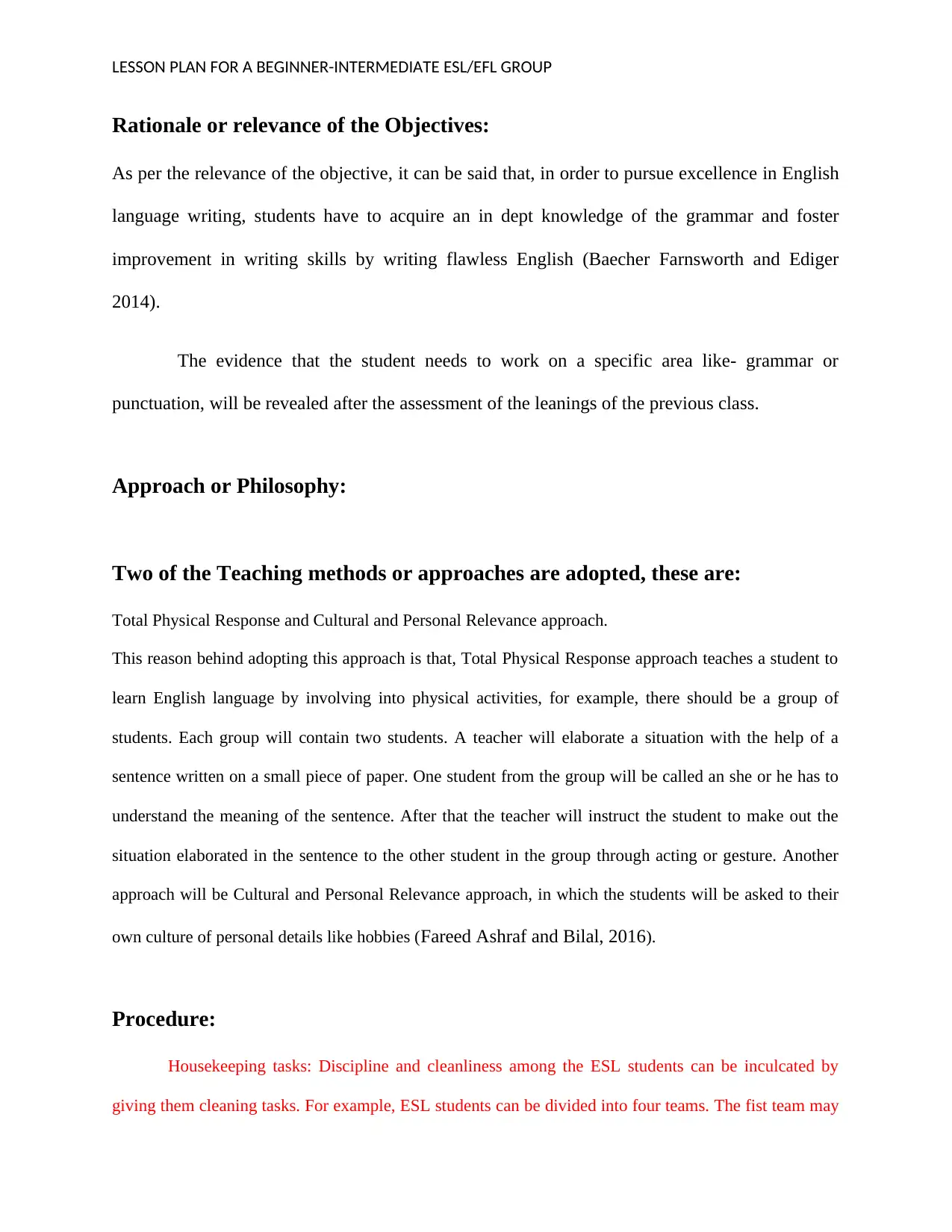
LESSON PLAN FOR A BEGINNER-INTERMEDIATE ESL/EFL GROUP
Rationale or relevance of the Objectives:
As per the relevance of the objective, it can be said that, in order to pursue excellence in English
language writing, students have to acquire an in dept knowledge of the grammar and foster
improvement in writing skills by writing flawless English (Baecher Farnsworth and Ediger
2014).
The evidence that the student needs to work on a specific area like- grammar or
punctuation, will be revealed after the assessment of the leanings of the previous class.
Approach or Philosophy:
Two of the Teaching methods or approaches are adopted, these are:
Total Physical Response and Cultural and Personal Relevance approach.
This reason behind adopting this approach is that, Total Physical Response approach teaches a student to
learn English language by involving into physical activities, for example, there should be a group of
students. Each group will contain two students. A teacher will elaborate a situation with the help of a
sentence written on a small piece of paper. One student from the group will be called an she or he has to
understand the meaning of the sentence. After that the teacher will instruct the student to make out the
situation elaborated in the sentence to the other student in the group through acting or gesture. Another
approach will be Cultural and Personal Relevance approach, in which the students will be asked to their
own culture of personal details like hobbies (Fareed Ashraf and Bilal, 2016).
Procedure:
Housekeeping tasks: Discipline and cleanliness among the ESL students can be inculcated by
giving them cleaning tasks. For example, ESL students can be divided into four teams. The fist team may
Rationale or relevance of the Objectives:
As per the relevance of the objective, it can be said that, in order to pursue excellence in English
language writing, students have to acquire an in dept knowledge of the grammar and foster
improvement in writing skills by writing flawless English (Baecher Farnsworth and Ediger
2014).
The evidence that the student needs to work on a specific area like- grammar or
punctuation, will be revealed after the assessment of the leanings of the previous class.
Approach or Philosophy:
Two of the Teaching methods or approaches are adopted, these are:
Total Physical Response and Cultural and Personal Relevance approach.
This reason behind adopting this approach is that, Total Physical Response approach teaches a student to
learn English language by involving into physical activities, for example, there should be a group of
students. Each group will contain two students. A teacher will elaborate a situation with the help of a
sentence written on a small piece of paper. One student from the group will be called an she or he has to
understand the meaning of the sentence. After that the teacher will instruct the student to make out the
situation elaborated in the sentence to the other student in the group through acting or gesture. Another
approach will be Cultural and Personal Relevance approach, in which the students will be asked to their
own culture of personal details like hobbies (Fareed Ashraf and Bilal, 2016).
Procedure:
Housekeeping tasks: Discipline and cleanliness among the ESL students can be inculcated by
giving them cleaning tasks. For example, ESL students can be divided into four teams. The fist team may
Paraphrase This Document
Need a fresh take? Get an instant paraphrase of this document with our AI Paraphraser
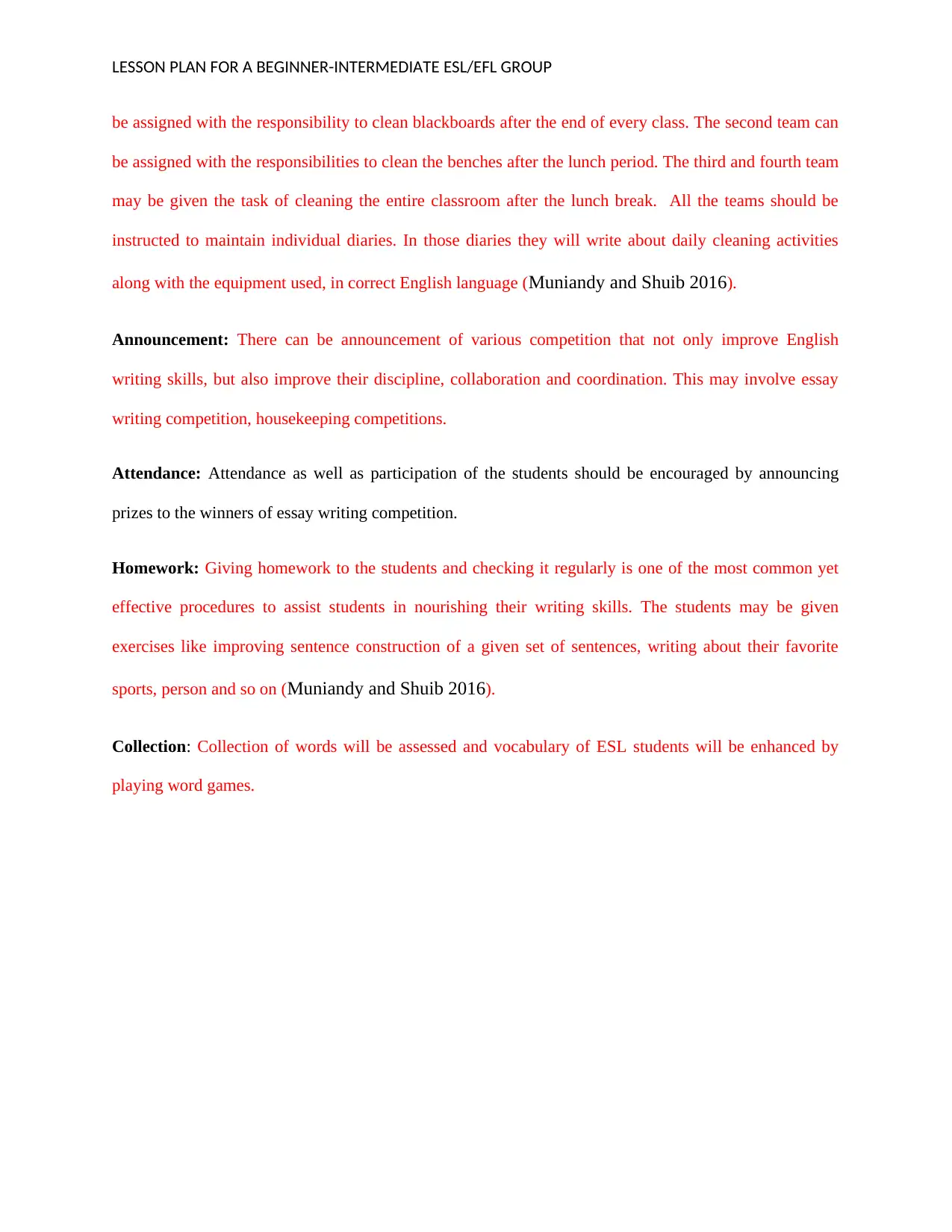
LESSON PLAN FOR A BEGINNER-INTERMEDIATE ESL/EFL GROUP
be assigned with the responsibility to clean blackboards after the end of every class. The second team can
be assigned with the responsibilities to clean the benches after the lunch period. The third and fourth team
may be given the task of cleaning the entire classroom after the lunch break. All the teams should be
instructed to maintain individual diaries. In those diaries they will write about daily cleaning activities
along with the equipment used, in correct English language (Muniandy and Shuib 2016).
Announcement: There can be announcement of various competition that not only improve English
writing skills, but also improve their discipline, collaboration and coordination. This may involve essay
writing competition, housekeeping competitions.
Attendance: Attendance as well as participation of the students should be encouraged by announcing
prizes to the winners of essay writing competition.
Homework: Giving homework to the students and checking it regularly is one of the most common yet
effective procedures to assist students in nourishing their writing skills. The students may be given
exercises like improving sentence construction of a given set of sentences, writing about their favorite
sports, person and so on (Muniandy and Shuib 2016).
Collection: Collection of words will be assessed and vocabulary of ESL students will be enhanced by
playing word games.
be assigned with the responsibility to clean blackboards after the end of every class. The second team can
be assigned with the responsibilities to clean the benches after the lunch period. The third and fourth team
may be given the task of cleaning the entire classroom after the lunch break. All the teams should be
instructed to maintain individual diaries. In those diaries they will write about daily cleaning activities
along with the equipment used, in correct English language (Muniandy and Shuib 2016).
Announcement: There can be announcement of various competition that not only improve English
writing skills, but also improve their discipline, collaboration and coordination. This may involve essay
writing competition, housekeeping competitions.
Attendance: Attendance as well as participation of the students should be encouraged by announcing
prizes to the winners of essay writing competition.
Homework: Giving homework to the students and checking it regularly is one of the most common yet
effective procedures to assist students in nourishing their writing skills. The students may be given
exercises like improving sentence construction of a given set of sentences, writing about their favorite
sports, person and so on (Muniandy and Shuib 2016).
Collection: Collection of words will be assessed and vocabulary of ESL students will be enhanced by
playing word games.
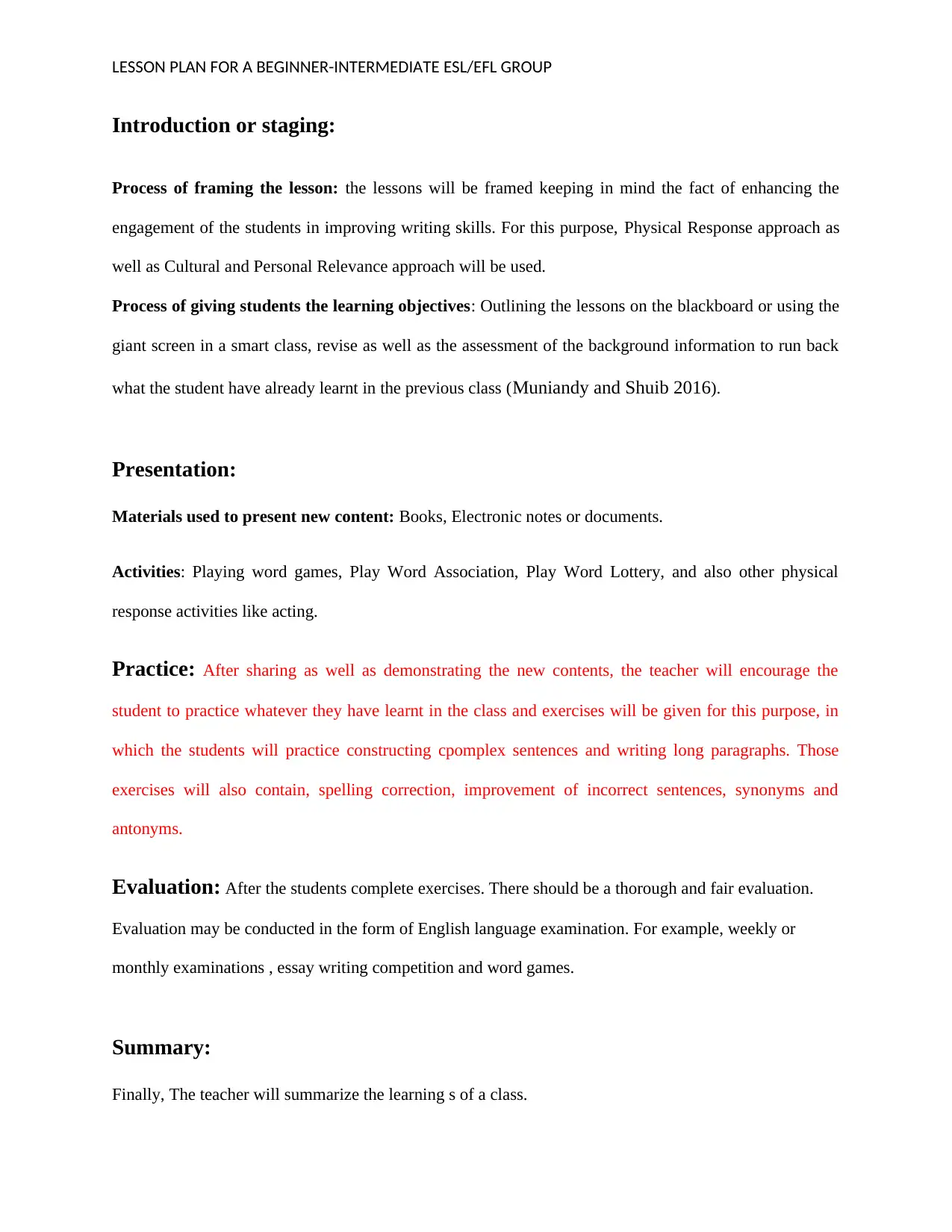
LESSON PLAN FOR A BEGINNER-INTERMEDIATE ESL/EFL GROUP
Introduction or staging:
Process of framing the lesson: the lessons will be framed keeping in mind the fact of enhancing the
engagement of the students in improving writing skills. For this purpose, Physical Response approach as
well as Cultural and Personal Relevance approach will be used.
Process of giving students the learning objectives: Outlining the lessons on the blackboard or using the
giant screen in a smart class, revise as well as the assessment of the background information to run back
what the student have already learnt in the previous class (Muniandy and Shuib 2016).
Presentation:
Materials used to present new content: Books, Electronic notes or documents.
Activities: Playing word games, Play Word Association, Play Word Lottery, and also other physical
response activities like acting.
Practice: After sharing as well as demonstrating the new contents, the teacher will encourage the
student to practice whatever they have learnt in the class and exercises will be given for this purpose, in
which the students will practice constructing cpomplex sentences and writing long paragraphs. Those
exercises will also contain, spelling correction, improvement of incorrect sentences, synonyms and
antonyms.
Evaluation: After the students complete exercises. There should be a thorough and fair evaluation.
Evaluation may be conducted in the form of English language examination. For example, weekly or
monthly examinations , essay writing competition and word games.
Summary:
Finally, The teacher will summarize the learning s of a class.
Introduction or staging:
Process of framing the lesson: the lessons will be framed keeping in mind the fact of enhancing the
engagement of the students in improving writing skills. For this purpose, Physical Response approach as
well as Cultural and Personal Relevance approach will be used.
Process of giving students the learning objectives: Outlining the lessons on the blackboard or using the
giant screen in a smart class, revise as well as the assessment of the background information to run back
what the student have already learnt in the previous class (Muniandy and Shuib 2016).
Presentation:
Materials used to present new content: Books, Electronic notes or documents.
Activities: Playing word games, Play Word Association, Play Word Lottery, and also other physical
response activities like acting.
Practice: After sharing as well as demonstrating the new contents, the teacher will encourage the
student to practice whatever they have learnt in the class and exercises will be given for this purpose, in
which the students will practice constructing cpomplex sentences and writing long paragraphs. Those
exercises will also contain, spelling correction, improvement of incorrect sentences, synonyms and
antonyms.
Evaluation: After the students complete exercises. There should be a thorough and fair evaluation.
Evaluation may be conducted in the form of English language examination. For example, weekly or
monthly examinations , essay writing competition and word games.
Summary:
Finally, The teacher will summarize the learning s of a class.
⊘ This is a preview!⊘
Do you want full access?
Subscribe today to unlock all pages.

Trusted by 1+ million students worldwide
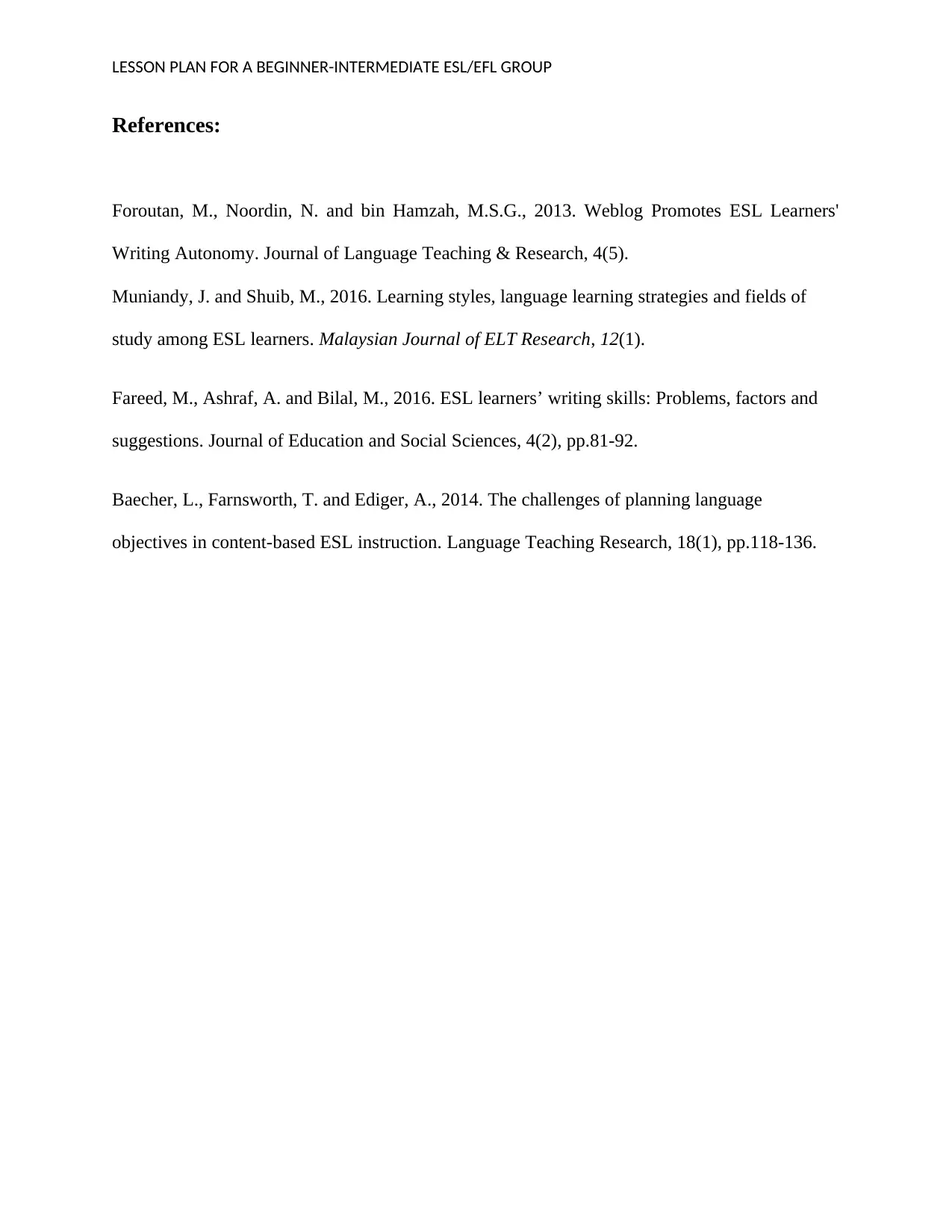
LESSON PLAN FOR A BEGINNER-INTERMEDIATE ESL/EFL GROUP
References:
Foroutan, M., Noordin, N. and bin Hamzah, M.S.G., 2013. Weblog Promotes ESL Learners'
Writing Autonomy. Journal of Language Teaching & Research, 4(5).
Muniandy, J. and Shuib, M., 2016. Learning styles, language learning strategies and fields of
study among ESL learners. Malaysian Journal of ELT Research, 12(1).
Fareed, M., Ashraf, A. and Bilal, M., 2016. ESL learners’ writing skills: Problems, factors and
suggestions. Journal of Education and Social Sciences, 4(2), pp.81-92.
Baecher, L., Farnsworth, T. and Ediger, A., 2014. The challenges of planning language
objectives in content-based ESL instruction. Language Teaching Research, 18(1), pp.118-136.
References:
Foroutan, M., Noordin, N. and bin Hamzah, M.S.G., 2013. Weblog Promotes ESL Learners'
Writing Autonomy. Journal of Language Teaching & Research, 4(5).
Muniandy, J. and Shuib, M., 2016. Learning styles, language learning strategies and fields of
study among ESL learners. Malaysian Journal of ELT Research, 12(1).
Fareed, M., Ashraf, A. and Bilal, M., 2016. ESL learners’ writing skills: Problems, factors and
suggestions. Journal of Education and Social Sciences, 4(2), pp.81-92.
Baecher, L., Farnsworth, T. and Ediger, A., 2014. The challenges of planning language
objectives in content-based ESL instruction. Language Teaching Research, 18(1), pp.118-136.
1 out of 7
Your All-in-One AI-Powered Toolkit for Academic Success.
+13062052269
info@desklib.com
Available 24*7 on WhatsApp / Email
![[object Object]](/_next/static/media/star-bottom.7253800d.svg)
Unlock your academic potential
Copyright © 2020–2026 A2Z Services. All Rights Reserved. Developed and managed by ZUCOL.


